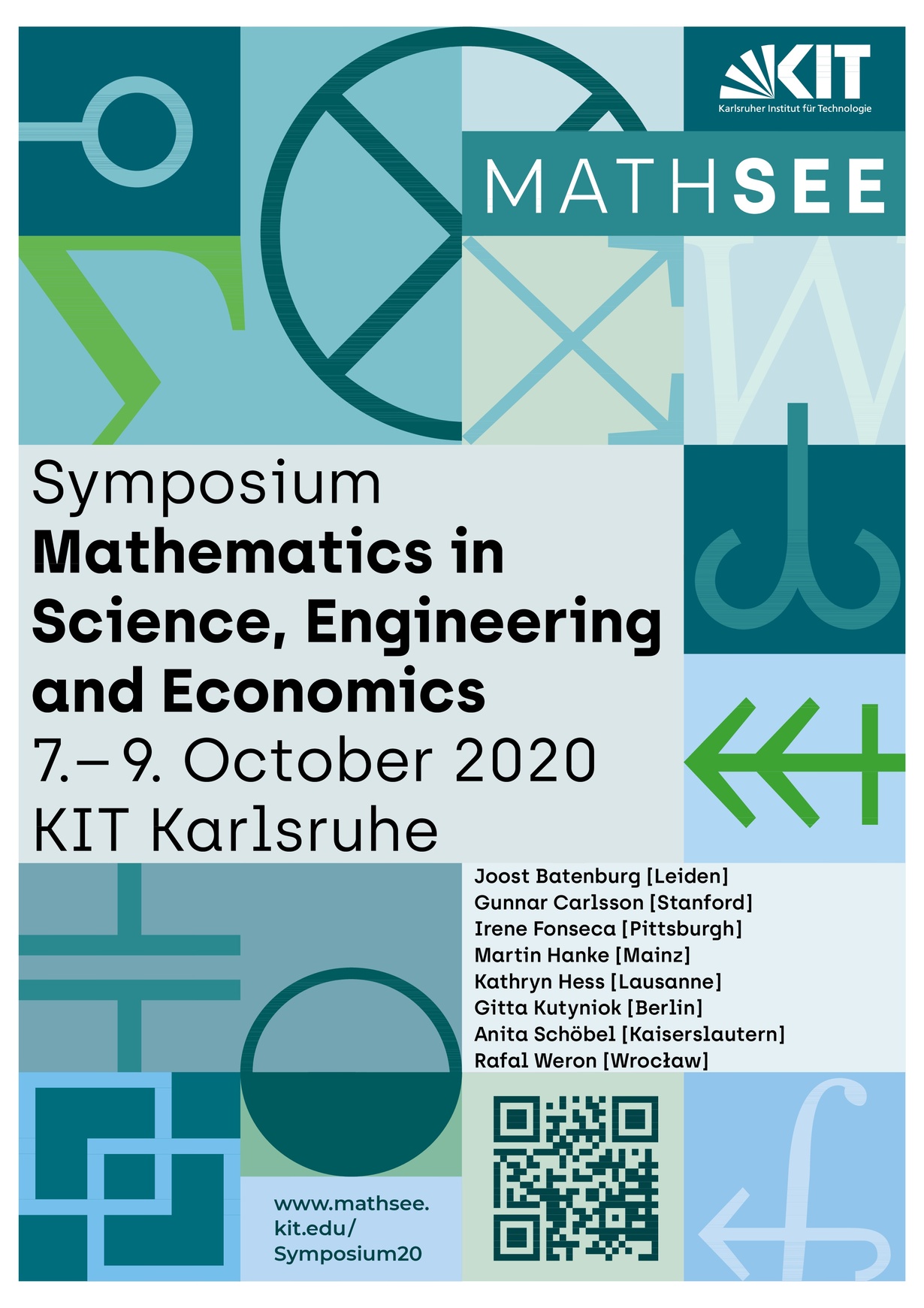
MathSEE Symposia

Public Engagement Events

Networking Workshops
Veranstaltungen
Montag, 02. März 2026
TBD
The workshop aims to unite the theoretical rigor of numerical mathematics, the stochastic analysis of data inaccuracies, and the flexibility and adaptability of machine learning. This interdisciplinary convergence is still in its infancy, and the workshop would initiate a systematic interaction between these communities. By exploring how error estimation, adaptivity, and convergence analysis can inform and enhance machine learning models for PDEs, we hope to lay the foundation for a new generation of hybrid computational surrogate methods that are reliable, data-aware, and numerically robust and efficient. To achieve these goals, the workshop will have several experts in the field give plenary lectures, have a poster session to foster extensive exchange of ideas, and a panel discussion with additional speakers from industry.
Montag, 16. März 2026
Workshop
TBD
The workshop aims to strengthen international research relations and to contribute both to methodological progress and to the understanding of dependence structures and extreme risks in complex systems.
Dependence structures and extreme value analysis are central to understanding complex systems where uncertainty, rare events and interactions play decisive roles. Applications in finance, insurance, climate science, and network reliability demand rigorous mathematical frameworks to quantify joint variability and tail dependence. Recent advances in copula theory, multivariate extreme value theory and theory for stochastic processes, including Lévy processes and max-stable processes, have deepened our understanding of such dependencies. These achievements not only advance theoretical insight but also provide statistical tools for inference from data, enabling the estimation and validation of complex dependence structures in empirical settings. The proposed workshop on Mathematical Advances in Dependence and Extremes (MADE@KIT) is scientifically motivated by the aim to integrate rigorous mathematical theory with practical, data-driven applications from SEE disciplines.
The workshop will bring together researchers from mathematics, statistics, and applied domains to discuss methodological innovations and emerging application areas. The scientific focus is on the interface between dependence modeling and extreme value analysis. Particular emphasis is placed on new copula constructions for high-dimensional dependence models, the relationships between asymptotic tail dependence and stochastic process representations, multivariate dependence concepts for extremes, data-driven estimation methods, and general computational techniques for rare-event inference. The applications range across risk management, actuarial, and climate science. The workshop’s pioneering character lies in its integrative approach, bringing together theoretical and applied perspectives on dependence and extreme value models. Through invited talks and structured discussion sessions, the event will promote scientific exchange and provide a basis for sustainable collaboration.
Dependence structures and extreme value analysis are central to understanding complex systems where uncertainty, rare events and interactions play decisive roles. Applications in finance, insurance, climate science, and network reliability demand rigorous mathematical frameworks to quantify joint variability and tail dependence. Recent advances in copula theory, multivariate extreme value theory and theory for stochastic processes, including Lévy processes and max-stable processes, have deepened our understanding of such dependencies. These achievements not only advance theoretical insight but also provide statistical tools for inference from data, enabling the estimation and validation of complex dependence structures in empirical settings. The proposed workshop on Mathematical Advances in Dependence and Extremes (MADE@KIT) is scientifically motivated by the aim to integrate rigorous mathematical theory with practical, data-driven applications from SEE disciplines.
The workshop will bring together researchers from mathematics, statistics, and applied domains to discuss methodological innovations and emerging application areas. The scientific focus is on the interface between dependence modeling and extreme value analysis. Particular emphasis is placed on new copula constructions for high-dimensional dependence models, the relationships between asymptotic tail dependence and stochastic process representations, multivariate dependence concepts for extremes, data-driven estimation methods, and general computational techniques for rare-event inference. The applications range across risk management, actuarial, and climate science. The workshop’s pioneering character lies in its integrative approach, bringing together theoretical and applied perspectives on dependence and extreme value models. Through invited talks and structured discussion sessions, the event will promote scientific exchange and provide a basis for sustainable collaboration.
Montag, 23. März 2026
9:00
9th Spring School | Lattice Boltzmann Methods
University of Liverpool (UOL), Rendall Building, Liverpool L69 7WW, United Kingdom
Objective
The spring school introduces researchers and users from industry to the theory of LBM and trains them on practical problems. Option B: the first half of the week is dedicated to theoretical fundamentals up to ongoing research on selected topics in kinetic theory, scientific computing, LBM, and Partial Differential Equations (PDE). Followed by mentored training on case studies using OpenLB in the second half of the week. Emphasis is placed on the modelling and simulation of particulate, multi-component, and turbulent fluid flows. Option A: Advanced OpenLB users and developers are enabled to solve their own application problems and implement their own solution approaches.
This educational concept is unique in the LBM community and offers a comprehensive and personal guided approach to LBM. Participants also benefit from the knowledge exchange during the poster session, coffee breaks and an excursion.
Executive committee John Bridgeman (UOL), Davide Dapelo (UOL), Mohaddeseh Mousavi Nezhad (UOL), Shota Ito (LBRG/KIT), Mathias J. Krause (LBRG/KIT), Stephan Simonis (ETH Zürich)
Host Organization University of Liverpool (UOL)
Venue University of Liverpool (UOL), Rendall Building, Liverpool L69 7WW, United Kingdom
The Field of Lattice Boltzmann Method Lattice Boltzmann Methods (LBM) are an established numerical technique for Computational Fluid Dynamics (CFD) and beyond. The simulation of complex multi-physics benefits strongly from the mesoscopic modelling of LBM and positions it next to traditional numerical methods. The rapid development in LBM – also driven by the emergence of massive parallel computing infrastructure – enables engineers to solve relevant problems for academia as well as for industry.
Target audience The expected attendees are developers and researchers, from industry and academia interested to learn theoretical and practical aspects of LBM. The spring school addresses e.g. engineers, computer scientists, mathematicians and physicists as well as Master and PhD students. The course level is either beginners (Option B) or advanced (Option A). Based on the interest in CFD, this course provides a collaborative platform for LBM, both for developers and researchers.
This educational concept is unique in the LBM community and offers a comprehensive and personal guided approach to LBM. Participants also benefit from the knowledge exchange during the poster session, coffee breaks and an excursion.
Executive committee John Bridgeman (UOL), Davide Dapelo (UOL), Mohaddeseh Mousavi Nezhad (UOL), Shota Ito (LBRG/KIT), Mathias J. Krause (LBRG/KIT), Stephan Simonis (ETH Zürich)
Host Organization University of Liverpool (UOL)
Venue University of Liverpool (UOL), Rendall Building, Liverpool L69 7WW, United Kingdom
The Field of Lattice Boltzmann Method Lattice Boltzmann Methods (LBM) are an established numerical technique for Computational Fluid Dynamics (CFD) and beyond. The simulation of complex multi-physics benefits strongly from the mesoscopic modelling of LBM and positions it next to traditional numerical methods. The rapid development in LBM – also driven by the emergence of massive parallel computing infrastructure – enables engineers to solve relevant problems for academia as well as for industry.
Target audience The expected attendees are developers and researchers, from industry and academia interested to learn theoretical and practical aspects of LBM. The spring school addresses e.g. engineers, computer scientists, mathematicians and physicists as well as Master and PhD students. The course level is either beginners (Option B) or advanced (Option A). Based on the interest in CFD, this course provides a collaborative platform for LBM, both for developers and researchers.
